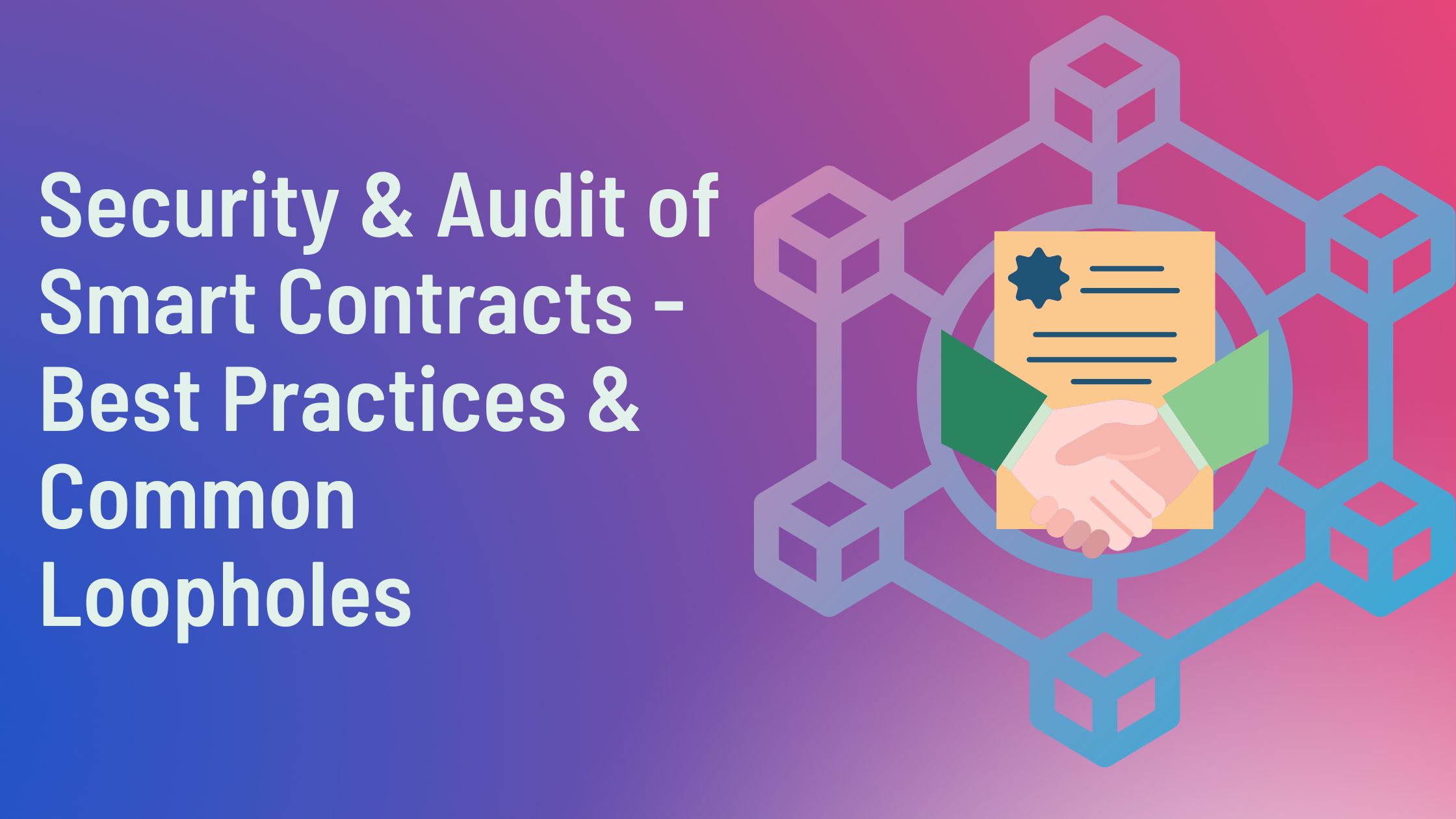Blockchain technology has consistently been a promising technology in the security landscape with its constantly changing scenarios. Smart contracts have been at the core of every blockchain that has made the technology applications in healthcare, finance, and many others.
Smart contracts as we know are computer programs that execute the transactions automatically once the predefined conditions are fulfilled. They enforce an agreement between the parties s involved in a transaction and run on the blockchain. Smart contracts can be simple or complex and have two, three, or even more parties involved.
The popularity of smart contracts has been increasing exponentially since their inception. In 2020, the average number of smart contracts made with Ethereum every day was 50. The high adoption of smart contracts by various industries is because of its advantages like immutability, transparency, cost-efficiency, accuracy, and trust.
Smart Contracts and Security Issues
Currently, the progress towards improvising blockchain technology with a focus on smart contracts has been at the forefront. But there is still a lack of reviewing the security of the smart contracts. Smart contract applications have been seen in various business areas but there have also been various security issues reported in smart contracts confining substantial financial losses.
These security issues pose new challenges for smart contracts since their execution environment is based on the decentralized, immutable nature of blockchain technology. To check this problem, numerous solutions are coming up to detect and address these securities vulnerabilities. It has become a necessity to identify and rectify these emerging smart contract security concerns on a global scale.
Writing a smart contract should be the developer’s highest priority since even a small error in the coding can result in financial losses. Thus, most networks suggest developers follow smart contract best practices to increase the safety and performance of smart contracts.
Best Practices For Smart Contract Security
Smart contracts are specific programs and the developers need to ensure the accuracy and security of the code. Here are some of the best practices to develop smart contracts –
- Avoid unnecessary extra functionality – Platforms like Ethereum and EOS are popular because of their rich functionality of smart contracts but this functionality usually comes at the price of security. Networks like Zilliqa and Cardano allow developers to improve the security of the code by adding more restrictions to the smart contracts. These restrictions reduce the functionality of the smart contracts but the additional control improves the security of the contract.
- Take wise decisions while using your programming language – Popular languages like C++ and JavaScript provide numerous opportunities to develop complex and highly functional smart contracts but they lead to threats to security. Popular programming languages are complex which may lead to various bugs or errors by even the most experienced developers. Thus, blockchains are coming up with programming languages that have simpler semantics and thus reduce the possibility of more errors in the code.
- Using blockchain-specific development practices – The development practices for smart contract development take into account the specific of the blockchain technology even though they are classified as a type of software. The price of the development mistake in it is much higher than in other software solutions. The code needs to be developed with care otherwise there is a risk of making a lot of critical errors. In many cases, the blockchain networks allow unexpectedly calling the contract code and inexperienced developers may leave such issues out and end up writing vulnerable codes.
- The vitality of testing and security audits – It is vital to run preliminary tests for smart contracts just like other software. The smart contracts must be tested thoroughly covering all testing options right from unit testing to cover basic functionality to releasing the smart contract on a test network first. This allows you to find critical errors in the code more effectively and fix them in advance. To ensure a high level of security for the smart contracts undertaking security audits are necessary. Professional auditors can not only detect possible flaws in the code but also give valuable feedback on how to fix them or optimize them. Lastly making people outside the project analyze the code gives a fresh perspective.
- Making use of additional testing tools – Additional testing tools are generally blockchain specific and they provide an additional check for the smart contracts. Some examples of Ethereum testing tools that help improve the security of their smart contracts are Test coverage analyzers, Linters, Formal verification, and symbolic execution. The set of preferred testing tools for security audits and testing of smart contracts varies from blockchain to blockchain. New and small smart contract platforms may not yet have their own set of testing tools.
Smart Contract Audits
Smart Contracts are a type of software and just like any other software they come with various security vulnerabilities. Therefore, smart contracts must go through a smart contract audit to make sure they are free of any security issues or vulnerabilities. Auditing also ensures that the smart contracts are optimized and working on ideal levels of performance.
Before the deployment of smart contracts, their audit will help developers easily identify vulnerabilities and bugs. This audit is extremely important because once the smart contract is written on the blockchain, it is impossible to change the code. An inadequate audit may result in discrepancies in the desired performance of the contract and risks such as loss of personal data or data theft.
Auditing smart contracts involve an in-depth evaluation focussing on rectifying design issues, security vulnerabilities, and code errors.
Best Practices for Smart Contract Audits –
- Agreement on specifications – The smart contract specification along with other related documents provides a clear explanation for the architecture, build process, and design choices of a project. There needs to be an agreement between the developers and the auditors on the specification of the smart contract. The first step to the audit process of the smart contracts is a full specification of the project.
- Testing process – The testing process in smart contract auditing offers simple and easy approaches for bug detection. Different options for testing could be considered as unit testing for targeting individual functions or integration tests for concerns of larger codes. By improving the test coverage, the count of bugs can be reduced and these can be eliminated easily. Testing also helps to build the confidence of the developers regarding the desired functionalities and performance of the project.
- Automated analysis – The demand for automatic bug detection software is increasing with time. Automated analysis tools help streamline the smart contract auditing process by identifying general issues in codes. It gives freedom from manual auditors reducing turnaround time and allowing auditors to focus their efforts on new and complex vulnerabilities.
- Manual analysis – Automated analysis tools are still in a nascent stage of development and thus, lack the understanding of the developer’s intentions. Therefore, there is a necessity for manual inception for improving the detection of possible smart contract vulnerabilities. The experience auditors evaluate the specification for confirming the project’s performance and accordingly offer reliable recommendations for improvement to the smart contract project team.
- Audit report – After all the above processes, an audit report is created. The findings of this report should be discussed between the audit team and the project team to understand the issues and vulnerabilities alongside the recommendations from the audit team.
Vulnerabilities in the smart contracts’ security
Most of the smart contracts deal with financial assets and thus vulnerabilities in the smart contracts can lead to financial losses. Since smart contracts are immutable, errors in smart contracts cannot be corrected easily. Transactions of faulty and fraudulent contracts cause changes in the blockchain state and they cannot be rolled back.
Companies and Developers offering smart contracts audit services
- Certik – Certik is a blockchain security company that has pioneered cutting-edge Formal Verification technology on smart contracts and blockchain technology. Certik undertakes a comprehensive security assessment of the smart contract and code, identifies vulnerabilities, and comes up with recommendations.
- Chainsulting – Chainsulting is a security audit firm that verifies the security of smart contracts and the integrity of its code. Their team has extensive knowledge in the blockchain sector which helps them deliver high-quality audit solutions tailored to the client’s requirements.
- OpenZeppelin – OpenZeppelin is an open-source platform and is used for developing secure decentralized applications (dApps). It performs security audits and implements security measures for the security of the dApps. Once they have identified potential problems in the code, they provide a report with best practices and recommendations.
Conclusion
Smart contracts are popular solutions with a lot of benefits in terms of trust, cost efficiency, and accuracy compared to traditional legal contracts. Like other software, smart contracts are also prone to vulnerabilities and code errors which hamper the security of smart contracts.
Multiple factors affect the security of smart contracts which include the type of blockchain network, the programming language, the platform used, and the testing performed before releasing the final version. It is important to observe and implement best practices while creating smart contracts to ensure their security.


